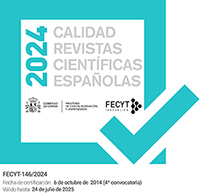Menores y huérfanos en la comunidad castellana de Brujas : una primera aproximación a su estudio
DOI:
https://doi.org/10.5944/etfiii.11.1998.3629Abstract
Los mercaderes castellanos que negociaban en Europa buscaron formas de asociación que, además de favorecer sus intereses profesionales, cumpliesen una tarea asistencial, proporcionando a sus miembros ayuda y apoyo. Es en una de esas funciones en la que vamos a fijar nuestra atención en el presente trabajo, en la protección que la Nación española de Brujas ofrecía a sus miembros más desvalidos: viudas y fiuérfanos de mercaderes allí residentes. Contemplamos los períodos de minoría de edad como especialmente delicados en la historia de las familias de mercaderes, pues podemos decir que suponían el principio del fin, al menos en lo que se refiere a su vinculación con el mundo de los negocios. La obsesión por conservar sus bienes suponía no incrementarlos. La ya disgregada hacienda paterna, que había sufrido diversas particiones, no podía soportar ni resistir la inactividd de la inversión durante una larga espera.
The Castilian merchante who traded in Europe looked for forms of association which, apart from fulfilling a helping task, also favoured their professional interests, providing their members with help and support. It is in one of these functions that we are going to look at in this work, focusing our attention on the protection which the Spanish Nación in Bruges offered its more helpless members: widows and orphans of the merchants who were resident there. We will look at the periods of age of minority especially sensitive in the history of the merchants families, we could say which were the beginning of the end, and least in what was referred to as their links with the trading world. The obsession for conserving their goods meant non increasing them. The already disintegrated paternal propery that had suffered various divisions could not wittistand or endure the inactivity in investment during a long period of time.
Downloads
Downloads
Published
How to Cite
Issue
Section
License
Los autores que publican en esta revista están de acuerdo con los siguientes términos:
- Los autores conservan los derechos de autor (copyright) de las obras publicadas y garantizan a la revista el derecho de ser la primera publicación del trabajo al igual que permiten la reutilización del mismo bajo la licencia de uso indicada en el punto 2.
- Las obras se publican en la edición electrónica de la revista bajo una licencia Creative Commons Reconocimiento-NoComercial 4.0 Internacional, que permite a otros compartir el trabajo con un reconocimiento de la autoría del trabajo y de la publicación inicial en esta revista. Se pueden copiar, usar, difundir, transmitir y exponer públicamente, siempre que: i) se cite la autoría y la fuente original de su publicación (revista, editorial y URL de la obra); ii) no se usen para fines comerciales.
- Se permite y se anima a los autores a difundir electrónicamente las versiones pre-print (versión antes de ser evaluada) y/o post-print (versión evaluada y aceptada para su publicación) de sus obras antes de su publicación, ya que favorece su circulación y difusión más temprana y con ello un posible aumento en su citación y alcance entre la comunidad académica (por ejemplo, en repositorios institucionales o en su propio sitio web). Color RoMEO: verde. (Véase The Effect of Open Access) (en inglés).
Authors who publish in this journal agree to the following terms:
- Authors retain copyright and grant the journal right of the first publication with the work simultaneously licensed under a Attribution-NonCommercial-NoDerivatives 4.0 International, that allows others to share the work with an acknowledgement of the work's authorship and initial publication in this journal.
- Authors are able to enter into separate, additional contractual arrangements for the non-exclusive distribution of the journal's published version of the work (e.g., post it to an institutional repository or publish it in a book), with an acknowledgement of its initial publication in this journal.
- Authors are permitted and encouraged to post their work online (e.g., in institutional repositories or on their website) prior to and during the submission process, as it can lead to productive exchanges, as well as to earlier and greater citation of the published work (See The Effect of Open Access).







